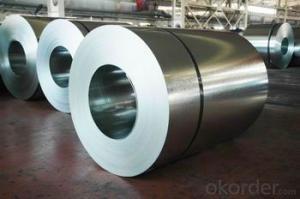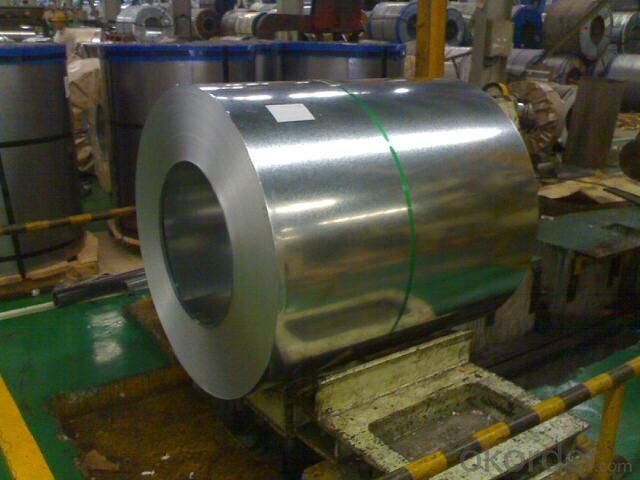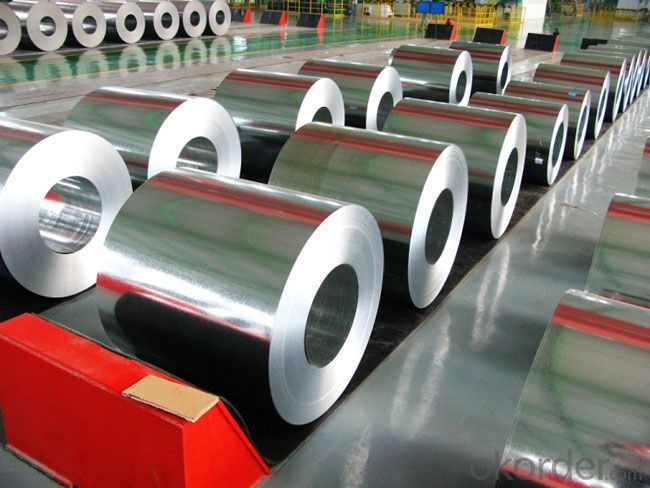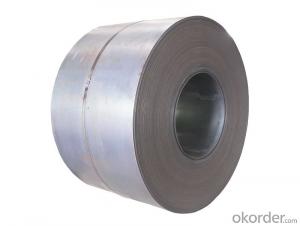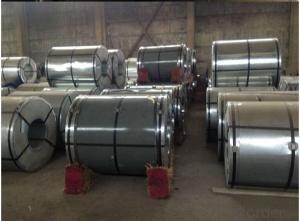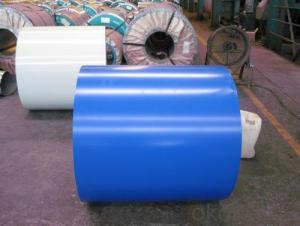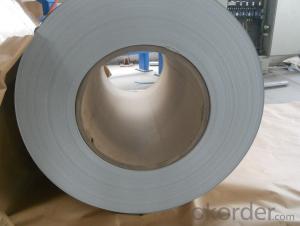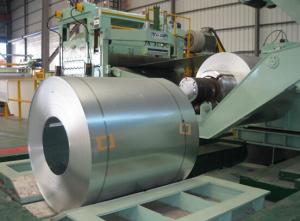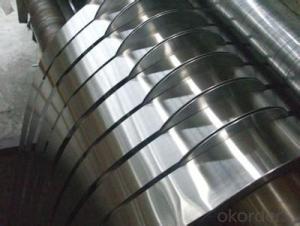Gavanized steel coils and sheets
- Loading Port:
- China Main Port
- Payment Terms:
- TT OR LC
- Min Order Qty:
- -
- Supply Capability:
- -
OKorder Service Pledge
OKorder Financial Service
You Might Also Like
Specifications
GI/HDGI
1.Size:0.16-0.7*900-1250mm
2.Z30-Z275
3.Any spangle
4.ISO
1.GI /Galvanized steel coil Good quality
CERTIFICATE | GI:ISO9001:2008 |
STANDARD | GI :ASTM A653, JIS G3302 SGCC/SGCH ,GB/T 2518, European standard |
GRADE | GI : SS grade 33-80; SGCC, SGCH, SGCD1-SGCD3, SGC340-SGC570, SGCC, DX51d |
MODEL NO. | GI :(0.14-1.5)*1250MM or under |
TYPE | GI :steel coil, steel sheets/ plates, corrugated steel sheets/plates |
TECHNIQUE | GI: hot rolled-cold rolled-galvanized |
SURFACE TREATMENT | GI : Mini/regular/big/zero spangle, ,Chromate treatment/ chromate-free treatment/ unSURFACE TREATMENTtreated Unoile/ oiled ,TENSION LEVELLERT SKIN PASS anti-fingerprint/Un-anti-fingerprint, coating |
APPLICATION | GI : structural use, roofing, commercial use ,household appliance,industry,family |
SPECIAL APPLICATION | GI :wear resistant steel, high-strength-steel plate |
- Q: I just bought a used Taurus 85 stainless 38 spl revolver, it's about 25 years old but looks like new. This is my first stainless steel gun. I'm wondering if there's any special things I need to be aware of or cleaning methods? I'm also wondering if stainless steel could rust? in theory stainless means it cannot get stained or rusty. I have a chrome bore AK, cleaning is always super easy, wondering of cleaning a SS revolver would be the same.
- Stainless steel does not rust. But your Stainless Barrel is not true stainless steel. True stainless steel is a mix of steel and chrome, and the chrome has a certaion percentage of the overal weight.. But a Stainless barrel does not contain enough chrome to be true stainless, so it can rust.
- Q: How are steel coils processed at the steel service centers?
- Steel coils are processed at steel service centers through a series of steps. First, the coils are unrolled and flattened using a decoiler and a leveling machine. Then, the steel is cut into the desired length and width using shears or slitting machines. Next, the coils may undergo various treatments such as pickling, galvanizing, or coating to enhance their corrosion resistance or appearance. Finally, the processed coils are inspected, packaged, and prepared for shipment to various industries for further manufacturing or construction purposes.
- Q: How are steel coils tested for quality?
- Steel coils are tested for quality through a series of rigorous inspections and tests. These include visual inspections to identify any surface defects, dimensional measurements to ensure proper size and shape, and mechanical tests such as tensile strength and hardness tests. Additionally, non-destructive testing methods like ultrasonic testing and magnetic particle inspection are used to detect internal defects or cracks. These comprehensive quality checks ensure that steel coils meet the required standards and are fit for their intended applications.
- Q: How do steel coils compare to other types of metal coils?
- Steel coils are highly regarded for their exceptional strength and durability, making them superior to other types of metal coils. Steel is known for its high tensile strength, allowing it to withstand heavy loads and resist deformation. This makes steel coils ideal for applications that require a high level of structural integrity, such as in the construction and automotive industries. In addition to their strength, steel coils also offer excellent corrosion resistance. Various protective layers, such as zinc or paint, can be applied to steel to prevent rusting and ensure longevity. This makes steel coils suitable for outdoor and marine environments where exposure to moisture and harsh weather conditions is common. Furthermore, steel coils have a diverse range of mechanical properties that can be customized through different manufacturing processes. This allows for the production of steel coils with specific characteristics, including high ductility, heat resistance, or electrical conductivity, to meet the requirements of various industries. When compared to other metal coils, such as aluminum or copper, steel coils often have a lower cost. Steel is one of the most economical metals available, and its abundance in nature contributes to its affordability. This makes steel coils a cost-effective choice for many applications, especially when large quantities are required. Overall, steel coils are distinguished by their exceptional strength, durability, corrosion resistance, versatility, and affordability. These qualities make steel coils the preferred choice for a wide range of industries, including construction, manufacturing, transportation, and energy.
- Q: what are the characteristics when of iron or steel when stretched? which one could be stretched further? which one stretches more evenly?thankyou
- Steel is harder and more brittle than iron since it has impurities which disrupt the regular layers of atoms. This means that the iron will stretch further and more easily. This also means it will stretch more easily.
- Q: I know sterling silver can tarnish, so I was just wondering, how does stainless steel hold up?
- Stainless okorder
- Q: I was wondering what kind of company casts and sells steel without acting as a contractor as well. They only sell steel no install it
- If you are talking about raw steel materials and products I believe you are talking about a steel processor and warehouse company or a steel distributor. There are many different points along the steel manufacturing process that you could buy steel products. It would depend on various factors. Depending the amount, type, grade, gauge, properties, origin and a host of other elements you could purchase the steel in billet, plate, diamond plate, rolled sheet (cold or hot), coil, beam, stamped, pickled, scrapped, etc. You get the idea. Now I don't know where you are in the world, but you can go to one of the two sites below, which I have used for product sourcing and research before. The last one is a major manufacturer that I have actually been to. I hope this helps.
- Q: How are steel coils used in the production of automotive frames?
- Steel coils are used in the production of automotive frames as they provide the necessary strength and durability. These coils are typically formed into specific shapes and sizes, which are then welded together to create the frame structure. The high tensile strength of steel coils ensures that the automotive frame can withstand the various stresses and strains experienced during vehicle operation, ensuring safety and stability.
- Q: Hey I just got a mini 14 manufactured in 1980. I also had some .223 Wolf steel cased HP rounds (about 200) that i could shoot throught it, but I was just wondering if its a bad idea to use this steel cased ammo...? Only the casing is steel i believe... and the bullet is copper jacketedthanks for your help
- I have had significant ejection and rechambering problems with Wolf semi-auto handgun ammo. It took forever to clean the fouling that the lacquered ammo generated too. I do not know about the rifle ammo, but I won't tempt fate over cheap rounds again.
- Q: I know that it is used for katanas and swords but what is it and is it good i am pretty sure that it is the process of the steel but can I have a little more information.
- It's a special type of steel that was made in Syria. It is used to make swords or knives. It's mostly used in Middle East and South Asia.
Send your message to us
Gavanized steel coils and sheets
- Loading Port:
- China Main Port
- Payment Terms:
- TT OR LC
- Min Order Qty:
- -
- Supply Capability:
- -
OKorder Service Pledge
OKorder Financial Service
Similar products
Hot products
Hot Searches
Related keywords
